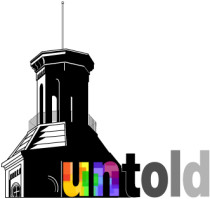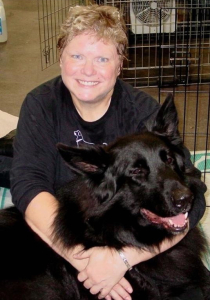Cover to Cover: My strange journey from a conflicted conservative evangelical to a straight ally
My journey to being an ally was a bit strange, as this message exchange shows:
Hi dan. I am confused on your position on gay marriage….?
How are you confused? Please clarify
It appears that you are pro gay marriage? How is that possible?
Intense Focused Bible Study!
He might have been expecting a reply like, “Well, my son is gay and that changed the way I look at things.” Almost every story I read about people who made the shift from a classic conservative anti-LGBTQ perspective to that of being an ally cites that kind of situation as the turning point. My answer of “Intense Focused Bible Study” could have caught him off guard and account for his confusion. However, those four words accurately reflect my journey from holding a classic conservative evangelical position to that of an ally.
Several years ago, a conversation with a Christian lesbian brought me to an uncomfortable realization; I had never done an independent, intensive study of what the Bible has to say on LGBT matters. From my childhood I was admonished not to let the crowd think for me but to “think for myself.” So, I set out to really study and figure out what the Bible had to say on this set of issues.
One of the most dangerous things you can do is to really study the Bible. It has a habit of correcting all kinds of ideas you have sincerely held. Reflecting on that, I determined to put preconceived conclusions and cultural assumptions aside and let God lead me where he would. If my thinking had to change in light of what I found, so be it. That is easy to say, but I found it harder to live out.
Next, I proceeded to read the entire Bible cover to cover keeping especially attentive to anything that could remotely condemn same sex activity or relationships. After all the rhetoric and condemnation I have heard on this issue, the result of my survey surprised me; my list of possibly relevant verses out of the thousands in the Bible was extremely short. Further detailed study of them would reduce this list even further.
As I reflected on this very short list, an important lesson from my days at Wheaton came back to help me out. “God is an impressive teacher and like all good teachers repeatedly emphasizes what is very important. Therefore, if a concept is found repeatedly throughout the Bible, from different human authors, cultures, times, and settings – take it very seriously. However, if a concept is only in one verse or even very few verses you have very little to go on. Come up with an opinion, but recognize it is only an opinion and hold it very humbly; do not use it to attack anyone else!”
This is when a sickening thought came to me, “Christians are condemning and chasing people away from Christ and the Church over such a small basis in Scripture. These few verses had better be really strong and good.”
Now that I had some context from the whole Bible perspective I went to do the hard work with each passage on my short list. This included digging into the cultures involved in each passage. Again, I was thankful for taking Old and New Testament Archaeology at Wheaton where I was taught to do this. Then I went into word studies and the various exegetical tasks that Wheaton College and Grad School taught me so well. My list, which included the classic “Clobber texts” steadily, shortened as I found major problems with each of them.
To give one example: arsenokoitai in 1 Cor. 6 and 1 Tim. 1 is very difficult to translate mainly because it is very rarely used anywhere and only twice in the Bible, both times by Paul and in a list. Which does not give us much context to know how exactly to take it. As a result over the years it has been translated many different ways. Since 1958 many English translations have used “homosexuals” which is actually the least likely one. However, it does reflect the conservative culture these translations came out of. A more likely translation is either “temple prostitute” or “pederast.” Both are possible given the context of the lists and were present in the Roman and Greek cultures. Both would have been very offensive to a Jewish mindset like Paul grew up with. Pederasty was especially rife and interestingly, German translations use words with similar meanings. Most important to the question I was dealing with, neither has anything to do with LGBTQ people. In fact, the vast majority of people today whether straight or LGBTQ find both concepts horrifying. As of this moment, I would translate it “pederasts” with a big footnote.
Finally, I went to see what various scholars and theologians had written on the subject. They came last because I did not want their ideas and prejudices to unduly influence my basic study. What I found was that most of the time the writings told me more about the writers, their cultural attitudes and prejudices than it did about the Bible texts.
Now, I faced the big decision. I could go with the conservative status quo. Pride, admitting that your old position is wrong and needs to change, stops many from taking another step. There were all the prejudices I absorbed from the conservative evangelical culture I grew up in and all those anti-gay lessons taught by those wonderfully sincere, devout people throughout my life. These are obstacles and stop many from changing their stance. Would I be like them?
Or I could go with everything I had uncovered during my study. The only way I could construct a case against LGBTQ people and their relationships was by reading prejudice and predetermined conclusions into the text. That was not something I could do and maintain respect for both the text and what God had shown me.
This is where the journey that started at a Bible Study that professor invited me to so many years ago culminated in my decision to go with what God had shown me, i.e., get past all the prejudice and embrace the fact that God loves all his children whatever their orientation may be.
I could not think of a way to summarize this for that private message conversation other than those four words, “Intense Focused Bible Study.” I am not at all sure going into all the details would have done any good. I doubt he is really ready to hear me out.
My path to becoming a “straight ally” is not the common one, but it does show how God can work thought his word to change our minds. My spirit agrees with my mind that I am now in a much better place.
Dan Baker, BS 1977, MA 1982
P.S. I found out my middle son is gay after going through all of this. I am very glad God took me on this journey first. When he came out to me I was ready and could love and support him unreservedly.



Great articled.
Thanks for your studied approach.
class of ’70 — did not graduate from Wheaton but maintain lots of friends from there. I enjoy the posts from
Wheaton 1. g